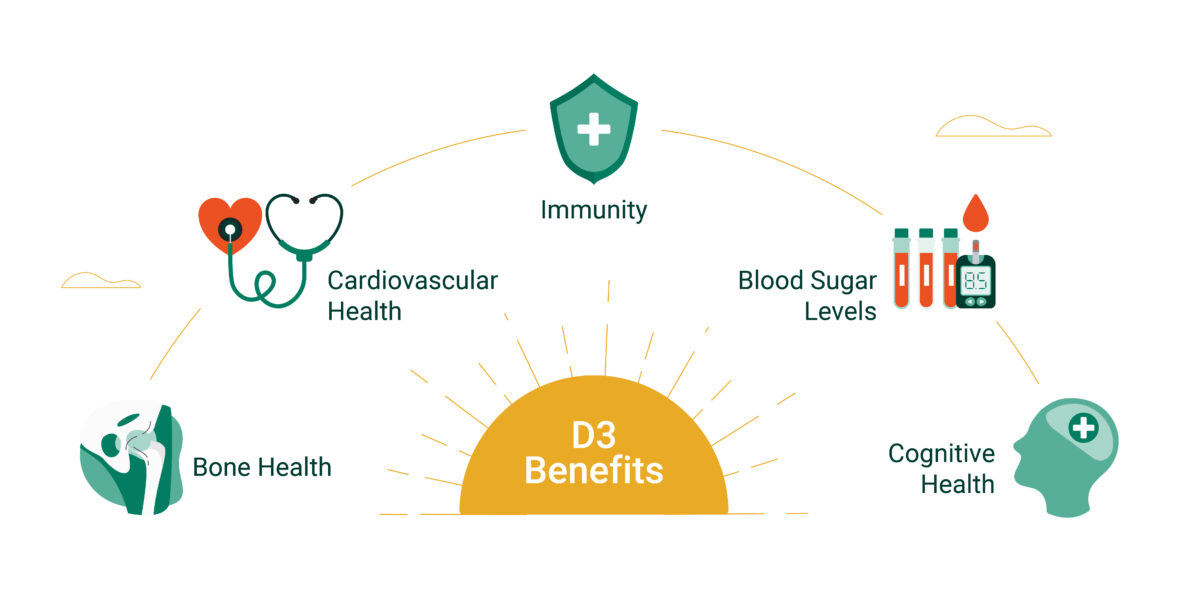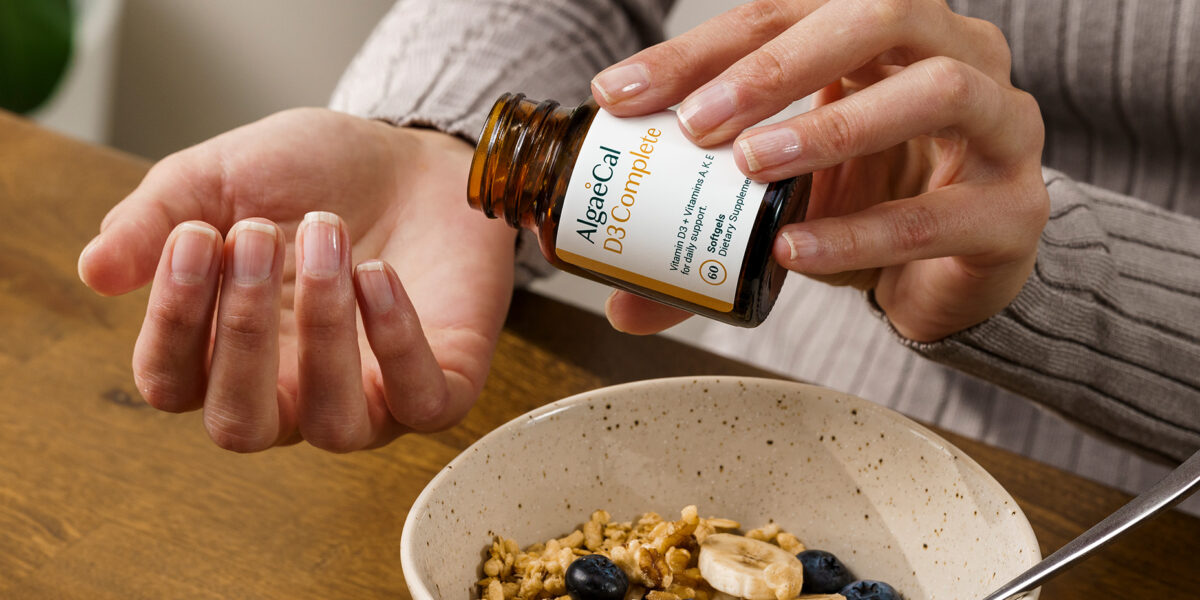Your Body has 30 Trillion Cells. They ALL Need Vitamin D.
That’s right. Every cell in your body benefits from Vitamin D. That’s because at the core of each of those 30 trillion cells is a vitamin D receptor. That’s important because these receptors act as switches that trigger vital functions such as immune strength, bone health, mood balance and more. And Vitamin D is the ONLY thing that can activate these switches.
In fact, without a steady supply of this essential nutrient, these functions will slow down, waver, and eventually cease to operate effectively. That’s why your body’s well-being hinges on vitamin D.
But unfortunately, 35% – 50% of Americans have a vitamin D deficiency. [1][2].
And here’s why that’s a problem…
All The Important Benefits of Vitamin D

Bone Health
Vitamin D is essential for strong and healthy bones because it helps your body take in calcium. No matter how much calcium you consume from food or supplements, you need vitamin D to absorb it properly. That’s why if you don’t have enough vitamin D, you’re more likely to develop bone problems like osteopenia and osteoporosis. [3].
Cardiovascular Health
There’s ongoing research about vitamin D’s role in heart disease prevention. What we do know is that vitamin D is important for heart health.
For instance, it helps regulate blood pressure by affecting the renin-angiotensin-aldosterone system.[4].
Vitamin D increases the production of renin, an enzyme that controls how much blood flows through your veins and arteries and manages how much your arteries tighten or relax. If renin levels are off, it can lead to too much fluid and tightness in your arteries, causing high blood pressure.[5].
Additionally, studies suggest that vitamin D is beneficial for maintaining healthy levels of blood lipids. This includes keeping HDL, LDL, and triglycerides at normal levels.[6].
Blood Sugar Levels
Vitamin D plays a vital role in how your body metabolizes glucose via its relationship with the hormone insulin. In your pancreas, vitamin D stimulates the release of insulin via its receptor on pancreatic beta cells. Insulin then goes on to help clear your blood of excess glucose, allowing you to maintain healthy blood sugar levels [7].
Your liver and muscle cells also have vitamin D receptors, which assist in peripheral insulin activity, further supporting healthy blood glucose [8].
Immunity
If you find yourself getting sick more often in winter, it might be because of low vitamin D levels. Vitamin D plays a key role in your body’s immune system in two main ways:
Innate Immunity: This is your body’s first line of defense against germs like bacteria and viruses. Vitamin D helps manage your body’s inflammatory response, which is crucial when fighting off these invaders.[9].
Adaptive Immunity: This is the second stage of your immune response, which targets specific threats more precisely. Unlike innate immunity that reacts generally, adaptive immunity targets specific invaders. Vitamin D influences this process too, as it works on T cells, B cells, and antibodies. It helps regulate these immune cells, ensuring that this targeted immune response works effectively.[10][11].
Cognitive Health
The precise role that vitamin D plays in cognitive health has yet to be established. However, research shows that this vitamin may have both neurotrophic and neuroprotective roles in your brain – assisting with the healthy growth and protection of brain and nervous system tissue [12].
In animal trials, vitamin D has been shown to reduce neurotoxicity and neuronal injury, which gives us some insight into the important role this nutrient may play in the human brain [13].
Also, there’s some evidence that having enough vitamin D might help maintain good brain function as we get older. This is thought to be because vitamin D can support neuroplasticity, which is the brain’s ability to adapt and form new connections. [14][15].
Targeted Benefits For Men and Women
In addition to the above benefits of vitamin D, this nutrient also has some targeted benefits for both men and women.
Vitamin D Benefits for Men
Research indicates that vitamin D plays a role in men’s reproductive health, particularly in boosting testosterone levels, especially in overweight men.[16].
Beyond affecting testosterone, vitamin D might also be involved in addressing erectile dysfunction. This could be because of how vitamin D contributes to the development of the penis, its role in aiding blood flow through nitric oxide and vessel widening, and its effects on male sex hormones.[17].
Vitamin D Benefits for Women
One of the common side effects that come with aging for women is vaginal dryness. Studies show that vitamin D, taken orally or as a suppository, may enhance female lubrication and reduce atrophy during menopause [18][19].

Are You Getting Enough Vitamin D?
As mentioned, a large portion of the US adult population is either low or deficient in vitamin D. While nutrient deficiencies in the US are rare due to a robust food supply and widespread fortification, vitamin D is an exception to the rule because most of our vitamin D synthesis happens via sunlight.
That means that you could be following the cleanest, most nutrient-dense, organic, local, diverse diet on the planet—and still be low in this critical vitamin.
Unless you consistently spend time outdoors with a good portion of your skin exposed, it’s likely that your vitamin D levels aren’t where they should be. And since vitamin D deficiency won’t cause obvious symptoms at first, it can go undetected for years.
So, are you getting enough vitamin D? The best way to know is to test your vitamin D levels, which can be accomplished with a simple blood test ordered by your doctor.
Tips To Boost Your Vitamin D Levels
If you know or suspect that you are low in vitamin D, there are a handful of ways to boost your levels so you can get back to optimal health.
More Sunlight
First, try to find ways to get more sunlight in your life. This could be as simple as taking a 20-minute walk during your lunch break or scheduling outdoor activities during your time off.
Vitamin D Rich Foods
Although diet is not the most effective way to increase vitamin D, you can find this nutrient in a handful of foods. Increasing your intake of foods like salmon, cod, sardines, eggs, and mushrooms may give you a little edge on your vitamin D stores – it certainly can’t hurt.
Vitamin D Supplements
If you really want to boost your vitamin D levels quickly, supplementing is the best way to do it. While sunlight can be an effective way to get more vitamin D, the sun isn’t always available to everyone, and depending on where you live, your UV exposure may not be sufficient to even make a dent in your vitamin D synthesis.
This is why vitamin D supplements are more than a backup plan; they’ve become essential for most people living in the modern world.
But not just any supplement will do; you’ll want to ensure that your vitamin D is both high-quality and supplying an adequate dose. For a high-quality vitamin D, ensure you’re getting it in the D3 form, not D2. While many companies add vitamin D2 to their products, D3 has superior bioavailability (it’s absorbed better) and, therefore, can boost your vitamin D levels much faster than a D2 supplement.

Takeaway
Beyond its critical role in bone health, vitamin D impacts almost every system in your body.
This is why supplementing with vitamin D is essential for most people, even those with a well-balanced diet.
For more information on healthy living and to stay up to date on the current research, sign up for the AlgaeCal Newsletter.
FAQs
What are the vitamin D benefits for men?
Studies show that vitamin D may specifically benefit men by supporting testosterone production and assisting in erectile dysfunction.
What are the vitamin D benefits for women?
Vitamin D may support vaginal health in menopausal women by reducing vaginal dryness and preventing vaginal atrophy.
What are the five benefits of vitamin D?
Vitamin D plays a role in various physiological systems with positive impacts on bone health, heart health, immunity, cognitive function, and blood sugar.
How do you get enough vitamin D?
There are several ways to enhance your vitamin D stores. First, try to increase your exposure to sunlight, and second, try adding in more foods that contain vitamin D. For a more definitive approach, take a high-quality vitamin D supplement to ensure you get enough of this crucial nutrient each day.





Danuta
February 4, 2024 , 5:03 amHow much vitamin D3 should I take it